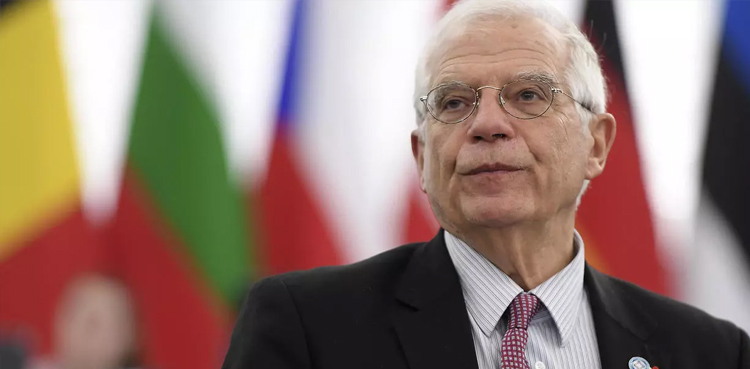EU’s foreign policy chief emphasized the need for a two-state solution, warning Israel against relying solely on military means for peace. The EU plans to engage with Israeli and Palestinian officials as well as key Arab states, reaffirming the desire to discuss and achieve a lasting resolution to the Israeli-Palestinian conflict.

BRUSSELS: The EU’s foreign policy chief on Monday insisted on a two-state solution as he told Israel it couldn’t build peace “only by military means” ahead of talks with Israeli and Palestinian top diplomats.
The bloc’s 27 foreign ministers are set to hold separate meetings with their counterparts from Israel, the Palestinian Authority and key Arab states in Brussels.
Borrell repeated the condemnation from the United Nations of Israeli Prime Minister Benjamin Netanyahu’s “unacceptable” rejection of calls for a Palestinian state after the war in Gaza.
“What we want to do is to build a two-state solution. So let’s talk about it,” Borrell said.
He told Israel that “peace and stability cannot be built only by military means”.
“Which are the other solutions they have in mind? To make all the Palestinians leave? To kill off them?” Borrell said.
Hamas’s surprise attack on October 7 on Israel and the subsequent devastating military response from Israel has plunged the Middle East into fresh turmoil and sparked fears of a broader conflict.
But while the bloodshed appears to have driven a long-term solution further out of sight, EU officials insist now is the time to talk about finally resolving the Israeli-Palestinian conflict.
The EU’s top diplomat said he had presented ministers from the bloc with a “comprehensive approach” towards trying to find a lasting peace.
The EU has struggled for a united stance on the conflict in Gaza as staunch backers of Israel such as Germany have rejected demands for an immediate ceasefire made from the likes of Spain and Ireland.
EU officials have sketched out broad conditions for “the day after” the current war ends in Gaza, calling for no long-term Israeli occupation, an end to Hamas’s rule and a role for the Palestinian Authority in running the territory.
Hamas, the Islamist movement that controls the Gaza Strip, launched a surprise attack on Israel on October 7, resulting in the death of about 1,140 people in Israel.
Militants also seized about 250 hostages during the attacks, around 132 of whom Israel says remain in Gaza.
Israel has vowed to “annihilate” Hamas in response and its relentless air and ground offensive has killed at least 25,105 people, mostly women and children, according to figures from the health ministry in Gaza.
Recent statements by Josep Borrell, the EU’s foreign policy chief, have shed light on the need for a holistic approach to peace in Israel. It is clear that relying solely on military solutions cannot bring about a sustainable resolution to the complex challenges facing the region. As we navigate the intricate landscape of international relations, it becomes increasingly evident that a multifaceted strategy, encompassing diplomacy, economic development, and cultural understanding, is essential for fostering enduring peace. Acknowledging the interconnected social, political, and economic dynamics at play in the region is pivotal to building a foundation for a peaceful coexistence. By embracing a comprehensive approach that goes beyond military tactics, Israel and its neighboring nations can strive towards a future defined by harmony and cooperation. This requires a collective effort from all stakeholders involved, and a commitment to explore avenues for dialogue and mutual understanding. The path to sustained peace in Israel necessitates a departure from the limitations of a militaristic mindset, and instead, a shift towards inclusive and cooperative strategies that prioritize the well-being of all individuals in the region.
Source: ARY NEWS
The EU’s foreign policy chief emphasized the need for a two-state solution and warned Israel against relying solely on military means for peace. Amid ongoing conflict in Gaza, EU officials are urging diplomatic talks to resolve the Israeli-Palestinian conflict. The EU has presented a comprehensive approach for a lasting peace, including conditions for the post-war period. Despite differing stances within the EU, there is a call for an immediate ceasefire and a role for the Palestinian Authority in Gaza. The article highlights the urgency for diplomatic efforts to address the escalating turmoil in the Middle East.
Disclaimer:
This content is AI-generated using IFTTT AI Content Creator. While we strive for accuracy, it’s a tool for rapid updates. We’re committed to filtering information, not reproducing or endorsing misinformation. – Khabristan.pk for more information visit privacy policy








Leave a Comment